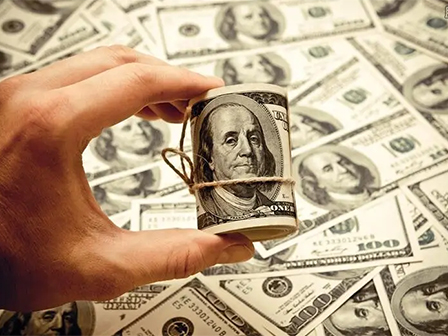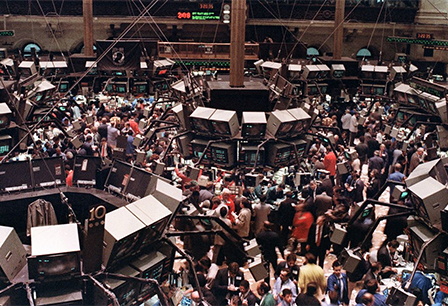这些天似乎你去任何地方都会一头撞进另一个即将到来的衰退的不祥预测。首席执行官、投资组合经理、政治家、新闻专家、远房表亲甚至 Cardi B 都在敲响警钟:听着!听到你们!经济低迷等待着所有敢于进入2023年的人!
But those predictions contradict the slew of positive economic data we’ve seen: The job market is healthy, wages are growing, Americans are spending and GDP is strong. Business is also good: Companies are largely beating revenue expectations and reporting positive earnings results.
The Federal Reserve’s regimen of painful interest rate hikes meant to tame persistent inflation could certainly cool the economy — as could events in Eastern Europe and China — but the economy has been able to successfully endure nearly a year of hikes and war in Ukraine with barely a dent.
It’s possible that recession chatter is just that. Chatter.
What’s happening: No one would ever accuse investors of shying away from their emotions: Passions run high on trading floors where feelings are often as valid as facts and fear and greed can sometimes run the show. Economists, on the other hand, are a data-dependent, stoic bunch. The US economy is not Wall Street, and market downturns are not recessions — but sometimes they get jumbled together in the public eye and their borders become hazy.
That appears to be the case: The Fed’s attempts to tamp down sky-high inflation are having an outsized impact on markets — the S&P 500 is down about 18% so far this year — but there has so far been little impact on the US economy as a whole.
This week, a number of top executives warned of an economic slowdown in 2023. CEOs from Goldman Sachs, JPMorgan, General Motors, Walmart, United and Union Pacific all said they were making plans for less-profitable times ahead. But hidden behind those “CEO PREDICTS RECESSION” headlines lies a lot of uncertainty.
Rising interest rates and geopolitical chaos are pointing towards storm clouds on the horizon, JPMorgan CEO Jamie Dimon told CNBC on Tuesday: “When you look out forward, those things may well derail the economy and cause this mild-to-hard recession that people are worried about.” When pressed to predict what was coming, he deflected. “It could be a hurricane. We simply don’t know,” he said. What was left unsaid was that sunny days are also a possibility.
Feedback loop: United Airlines CEO Scott Kirby also told CNBC on Tuesday that “we’re probably going to have a mild recession induced by the Fed.” He then went on to say that demand in his industry is higher than ever and United entered the fourth quarter with profit margins near all-time highs. He doesn’t see any indication of a slowdown on the horizon, either.
So why does he think a recession is coming? “If I didn’t watch CNBC in the morning, the word ‘recession’ wouldn’t be in my vocabulary,” he said. “You just can’t see it in our data.”
It’s almost as though Kirby predicted recession was imminent because other prominent voices predicted that recession was imminent. And it’s possible that we’re all stuck in a feedback loop that amplifies unjustified fear.
Prophecies are often self-fulfilling. If CEOs believe recession is coming, they preemptively batten down the hatches — and that means less spending and more layoffs, which in turn can trigger an economic downturn.
Goldman CEO David Solomon said Tuesday that the bank may soon terminate staff and exercise caution with its financial resources due to the mounting economic uncertainty. Morgan Stanley will reportedly slash its workforce by about 1,600 people, roughly 2% of the total.
The upside: Some parts of Wall Street seem to be avoiding the recession fervor. A recent study by Goldman Sachs found that smart money is betting on a soft landing. Money managers have been favoring industrial and commodity stocks that are sensitive to economic downturns. Stocks that act as a buffer during economic downturns like consumer staples and utilities have fallen out of favor at investment funds with assets totaling almost $5 trillion, Goldman strategists found.
“Current sector tilts are consistent with positioning for a soft landing,” they wrote.
Oil plunges below $75 for the first time in a year
Oil prices have tumbled to their lowest level since Christmas as worries about the health of the economy weigh on crude, overshadowing concerns about new restrictions imposed on Russian energy, reports my colleague Matt Egan.
Brent crude, the world benchmark, lost nearly 3% on Thursday to around $77.45 a barrel.
The oil selloff comes after the West hit Russia with new restrictions that, so far at least, do not appear to be derailing global energy markets.
The European Union on Monday imposed a ban on seaborne oil imports from Russia, while the West placed a $60 cap on Russian oil. Both moves are designed to hurt Russia’s ability to finance its war in Ukraine, without hurting consumers by causing Moscow to slash oil production.
“Russia oil is still on the market. As of now, it appears Russia is willing to play ball,” said Robert Yawger, vice president of oil futures at Mizuho Securities.
The tame reaction from energy markets is a welcome gift for Americans heading on long drives this holiday season, as prices at the gas pump are expected to continue their recent plunge.
US oil this week hit its lowest level since December 23, 2021, before recovering a little on Thursday to trade up 2% at $73.60 a barrel. That leaves oil down by 43% since briefly topping $130 a barrel in March amid fears about Russia’s invasion of Ukraine.
The national average price for regular gasoline dipped by three cents to $3.33 a gallon on Thursday, according to AAA. Gas prices have dropped 14 cents in the past week and 47 cents in a month. The national average is a cent lower than a year ago when they averaged $3.34 a gallon.
UK strikes to hit ambulance services, hospitals, trains in runup to Christmas
Britain is bracing for further disruption from strikes heading into the Christmas period, as ambulance drivers and nurses join rail operators and postal workers in the worst wave of walkouts the country has endured for at least a decade, reports my colleague Hanna Ziady.
More than 20,000 ambulance workers, including paramedics and call handlers, are expected to strike on December 21 in a dispute over pay, according to statements from labor unions GMB, Unison and Unite.
The strike will involve just under half of all ambulance drivers in England, Wales and Northern Ireland, although unions have said they will cover life-threatening emergencies during the walkouts. More than 10,000 ambulance workers represented by the GMB Union will strike again on December 28.
Strikes have swept the United Kingdom this year, as workers grapple with a cost-of-living crisis and stagnating wages. Consumer prices rose by 11.1% in the year to October, a 41-year high. Once inflation is taken into account, average wages fell by the biggest drop on record earlier this year, and were still declining in the June-September period.
According to The Times newspaper, one million UK workers are set to strike in December and January. Data from the Office for National Statistics shows Britain has already lost at least 741,000 days to strike action this year, putting it on track for its worst year of labor disputes in at least a decade.












